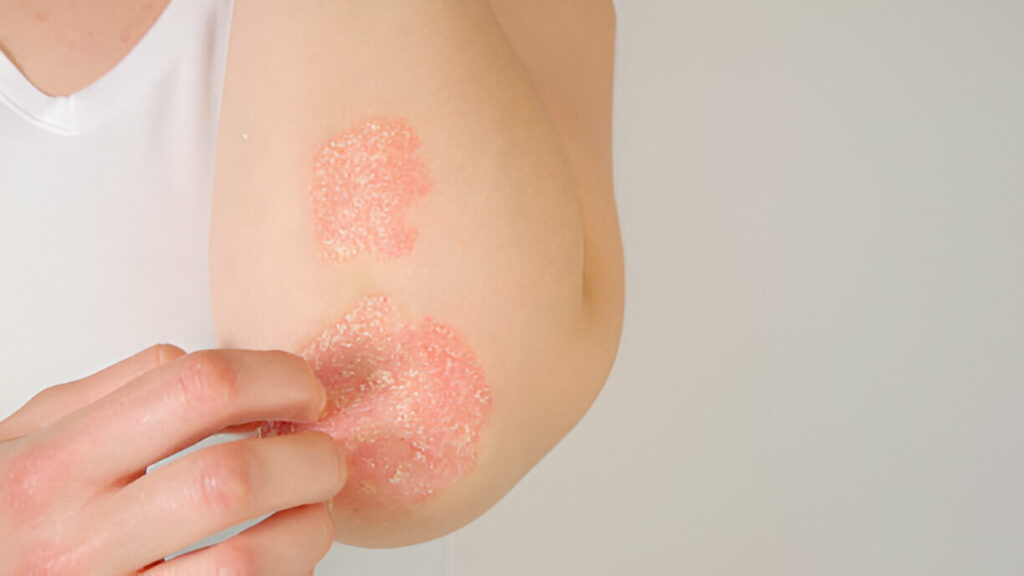In time, eczema appears and disappears. It causes extremely sensitive and dry skin, which can worsen with exposure to various allergens such as dust mites and pet dander. Your self-esteem doesn’t have to suffer because you have eczema, and neither does your social life! Getting involved in your school and extracurricular activities can be a great way to get your mind off the itch.
What is Eczema
Dry, itchy, and inflammatory skin are symptoms of atopic dermatitis, often known as eczema. It can happen at any age, although it’s more common in young children. Atopic dermatitis is a chronic condition that occasionally flares up. It’s not contagious, although it can be annoying.
Food allergies, hay fever, and asthma are all possible side effects for those with atopic dermatitis. Itching can be reduced and new outbreaks (flares) can be avoided by moisturizing frequently and practicing other skin care routines. Medicated creams or ointments may also be used as a kind of treatment.
Symptoms of Eczema? Targets and Concerns
Atopic dermatitis (eczema) symptoms can appear anywhere on the body and vary widely from person to person. They may include:
- Dry, cracked skin
- Itchiness (pruritus)
- Rash on swollen skin that varies in color depending on your skin color
- Small, raised bumps, on brown or Black skin
- Oozing and crusting
- Thickened skin
- Darkening of the skin around the eyes
- Raw, sensitive skin from scratching
Causes of Eczema
The incapacity of an individual to restore damage to their skin barrier results in eczema. This is caused by a mutation in the filaggrin gene. Filaggrin plays a crucial role in the development of the skin barrier. The filaggrin gene is normally found in two copies in each skin cell. On the other hand, eczema-prone individuals only have one copy of this gene.
While a normal skin barrier can be formed with only one copy of the gene, skin barrier repair requires two copies of the gene. A person with only one copy of the gene may find that their capacity to restore the skin barrier is restricted if their skin is exposed to irritants and their skin barrier is compromised.
The skin becomes dry and scaly as soon as the skin barrier is compromised, causing the skin to lose moisture. Environmental allergens, or stimulants from one’s surroundings, have the ability to penetrate the skin and trigger the immune system, resulting in inflammation and red, itchy skin.
Acne and other allergic disorders, such as asthma and hay fever, run in your family. These factors increase your risk of developing eczema. Diet is rarely the cause or aggravation of eczema. See your physician or a nutritionist for appropriate allergy tests and dietary recommendations if you believe a food is the cause.
Essential Strategies for Managing Eczema
The majority of eczema sufferers discover that commonplace factors like hot weather, frequent showers, soap, ducted central heating, and sleeping in a hot bed at night exacerbate their symptoms. There are steps you may do to lessen the frequency of flare-ups and improve how you manage your eczema. See your dermatologist or physician for more information and guidance at all times.
Coping Tips for Eczema
Eczema-affected skin is more prone to warts, impetigo, and cold sores, among other illnesses. Staphylococcus aureus is a bacterium that might potentially aggravate eczema symptoms and result in a subsequent impetigo infection.
- Avoid too hot showers and instead for mild baths or showers.
- Avoid using regular soap because its components could make your eczema worse. Steer clear of overheating your skin. Instead of wearing one bulky layer, wear several that you may remove as needed. Keep the number of blankets on your bed in check.
- Use of scented bubble bath or “medicated” bath products is not advised.
- Keep in mind that skin irritation can occur from even hypoallergenic cosmetics. Try not to wear makeup on your face at all times.
- Keep your fingernails short; when you scratch, longer nails are more likely to cause injuries to your skin.
- Installing a water softening system might be a good idea if the water in your neighborhood is alkaline or “hard,” or full of minerals.
- When the weather is warm, take a swim in the sea as seawater is believed to lessen eczema symptoms.
- When swimming at the beach, for example, restrict your time in the sun. This may lessen the symptoms of eczema. However, be mindful that UV radiation raises the risk of skin cancer and accelerated aging of the skin. Additionally, overheating brought on by sun exposure might exacerbate eczema.
Why Choose Gangnam Theme Dermatology
With that, we have learned that Eczema is a long-term skin disorder that can lead to scaly, itchy spots. If you try at-home cures and your symptoms still don’t improve, see a doctor at Theme Dermatology. We can assist in creating a personalized treatment plan for you.
With three board-certified dermatologists with extensive expertise, Gangnam Theme Dermatology is one of the oldest dermatology practices in Gangnam, Seoul, South Korea. It can be found right between Sinnonhyeon and Gangnam Stations, in the center of the famous Gangnam neighborhood. With an extensive experience of over 20 years in dermatology, our team of specialists is highly regarded for their expertise and unwavering commitment to excellence. Over more than 20 years, the clinic cared for patients with various skin issues and types. They can assist you with acne, pigmentation, anti-aging (lifting), scars, and other skin issues. Also, among Korean clients, they are one of the most well-known skin clinics. The variety of services they offer and their knowledge of skin issues will satisfy you.
Gangnam Theme Dermatology Booking Information
The clinic can be found at 423 Gangnam-daero, Seocho-gu, Hanseung Building, 7th Floor, Seoul, South Korea. To reach out directly, dial +821094839974 on WhatsApp and Kakao. Sending a message to Gangnam Theme Dermatology will allow you to talk about your concerns, make an appointment, or receive an online consultation. Send an email to [email protected]. You can also look through everything and ask questions on the Gangnam Theme Dermatology website by clicking this link: https://themedermatology.com/about-us/.


FAQs
To prevent eczema flare-ups, it is crucial to recognize and steer clear of triggers, adopt proper skincare routines (such as regular moisturizing and the use of gentle, fragrance-free products), effectively manage stress, maintain a nutritious diet, stay adequately hydrated, and adhere to the treatment and management advice provided by your dermatologist.
It is crucial to seek guidance from a dermatologist or healthcare professional if you are encountering symptoms of eczema, like red, itchy, and inflamed patches of skin. Dermatologists are able to offer tailored treatment suggestions, prescribe medications, and provide advice on effectively managing eczema.
Although dietary changes may not provide a complete cure for eczema, certain individuals have reported that specific foods can potentially worsen symptoms or trigger flare-ups. By maintaining a food diary and steering clear of common trigger foods like dairy, eggs, nuts, and wheat, it is possible to identify dietary triggers and potentially minimize the frequency and intensity of eczema flare-ups.
Conclusion
Living with eczema may present challenges, but you do not have to face them alone. It is important to reach out to healthcare providers, family members, and support groups for assistance in managing the physical and emotional difficulties associated with eczema. Prioritize self-care, and stress management, and remain patient and persistent throughout your treatment process. By staying dedicated and seeking support, it is possible to find relief from eczema symptoms, leading to healthier and more comfortable skin, as well as an improved quality of life. Through the implementation of personalized treatment plans, self-care practices, and seeking guidance from healthcare professionals and loved ones, you can discover the path to eczema relief and regain control over your skin health. Remember, managing eczema is a journey that requires patience, determination, and a strong support system to achieve relief and live comfortably with this condition.

